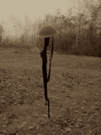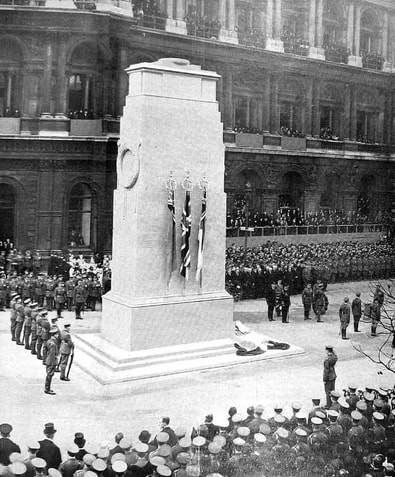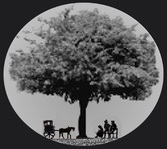The War Memorial Unveiled
|
The nations memorial to its war dead is called "The Cenotaph" which was erected in 1920 on Whitehall in Westminster. A cenotaph is an empty tomb or monument erected to honour a person or group of people who lie buried elsewhere. The following is a brief account of its unveiling ceremony: "The [London} memorial was unveiled by King George V on 11 November 1920, the second anniversary of the Armistice with Germany which ended the First World War. The unveiling ceremony was part of a larger procession bringing the Unknown Warrior to be laid to rest in his tomb nearby in Westminster Abbey. The funeral procession route passed the Cenotaph, where the waiting King laid a wreath on the Unknown Warrior's gun-carriage before proceeding to unveil the memorial which was draped in large Union Flags." Many monuments of similar design were erected throughout Britain. The Cenotaph may well have been the inspiration for Gildersome.
|
( both the quote and photo from Wikipedia)
|
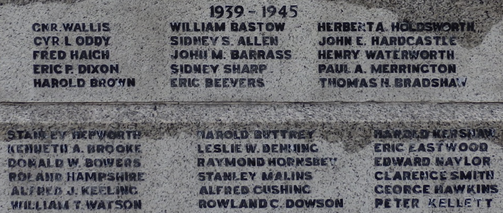 Those lost in the 2nd World War (Click to expand)
Those lost in the 2nd World War (Click to expand)
At the time of Gildersome's own dedication ceremony (1923), it was the nation's fervent hope that humanity had learned a terrible lesson and that those commemorated would be the last. Tragically, twenty five years later, the Second World War claimed the lives of another thirty three Gildersome men. Their names were added to the dedication side (south) of the memorial. Next year, 2019, will be the 80th anniversary of the commencement of that bitter conflict .
In a dedication ceremony on the 12th May 1923, presided over by Lieut. Col. Bousfield, Gildersome's War Memorial was unveiled.
The following account of that ceremony was published in the Morley Observer on the 18th:
The following account of that ceremony was published in the Morley Observer on the 18th:
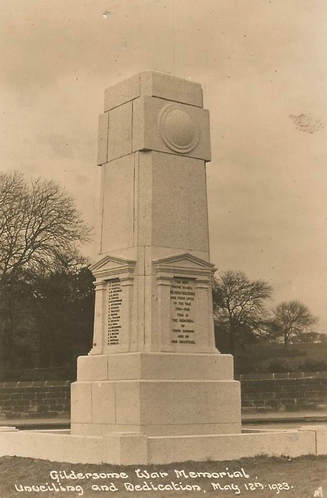
In the presence of a large number of people the Gildersome War Memorial, which has been erected on the Green, to the memory of the 60 men of the village who gave their lives in the Great War, was unveiled last Saturday by Lieut. Col. Bousfield, D.S.O., T.D.
The memorial is of Cenotaph design, and is composed of Cornish Granite. It is 15 feet high, and has been executed to the design of Mr. A.C. Holliday, B.A., A.R.I.B.A., son of ex-Councillor R.A. Holliday of Gildersome, by Messrs. Wright and Son, monumental masons, of Bradford. In panels at the sides of the Cenotaph are inscribed the names of the 60 men of the village who laid down their lives in the Great War. On the front panel are the words: "The men whose names are here inscribed gave their lives in the War, 1914-1918. This is a memorial of their honour, and of our gratitude."
Councillor A. Brooke (chairman of the War Memorial Committee) presided, and on the platform were Lt. Col. and Mrs. Bousfield, Councillor G. Seed, J.P. (chairman of the Gildersome Urban District Council), the Rev. F. Hurst (vicar of Gildersome), the Rev. W.K. Still (Baptist minister). Amongst those present were also Councillor and Mrs. G.E. Wilson, Councillor and Mrs. A.D. Barker, Councillors J. Thornton, A. Booth, S. Barron, A. Jowett, S. Hartley, J. Leak, A. Kellett, Mr. H.B. James (clerk to the District Council) and Mrs. James, Dr. and Mrs. W.H. Holliday, Mrs. J.R. Wilson, Mrs. P.H. Booth and Misses Booth, Mr. S. Crowther and Mr. W. Wilby, (secretary to the Memorial Fund). There was also a choir from the elementary schools, and a combined choir from the Gildersome churches and chapels, who were under the conductorship of Mr Coope, organist and choirmaster of the Baptist Church. A number of ex-Service men, wearing their medals, were under the command of Lt. J. Wilson, Sgt. Sykes and Sgt. Hutchinson. Many of the children were wearing their father's medals.
An impressive ceremony opened with singing of the hymn "Our God, our help in ages past," which was followed by scripture sentences and prayer by the Rev. W.K. Still. Pte L. Scargill also gave a reading of the scriptures.
In the course of the address L. T. Col. Bousfield said he was very proud of the privilege of being asked to unveil the memorial, not owing to the fact that he had been chosen to perform this solemn ceremony from among those whose privilege and duty it was during the war to command the fighting men, but because of his association with those fighting men, first as a leader of a company, and afterwards of a battalion.
During the last four years they had heard a good deal on the subject of war memorials and the opinion had been expressed that it would be very much better if the money subscribed to these memorials were put to some object such as the relief of distress. He did not agree with that criticism. He believed that the erection of these memorials in every town, village, school and place of business was a magnificent thing. "This great war which has come to an end was not only a struggle between the fighting forces of the nations," said the speaker, " it was much bigger than that. It was the antagonism of the spirit of one nation against that of the another. The war did not decide whether the fighting forces of one nation were stronger than the fighting forces of another, or which were more numerous or had more staying power. It was a question of which had the highest spirit. We all had to take a part, not only those gallant 60 heroes, but the whole community. If the nation had not done that the fighting forces of which these men were representatives would not have come through victorious. It is only a proper and fitting thing that there should be in every village a permanent memorial for all time of the fact that the spirit of the English nation rose up to the summit in the hour of its greatest danger to the history of the world - and came out on top. The fact that the German Army was defeated did not alone bring victory. At the time of the Armistice, in fact, the German Army was not utterly defeated, but the spirit of the German nation was broken, and that was what brought about the final scene in the Great War. It was the British nation that helped us to victory by the magnificent spirit shown during the great struggle. These memorials should keep the thought of that from generation to generation." The bodies of the men in whose memory the memorial had been erected lay far away, In France, Mesopotamia, and Salonica, or at the bottom of the sea. There were sorrowing relatives there in Gildersome, and here they could lay their simple tributes of affection and love. What were the graveyards for if not for some outward symbol of love toward those who were dead? It would be a cruel thing if some such symbol were not provided where the relatives of the fallen heroes could lay their offerings.
Sixty men of Gildersome had given their lives for their country. He was very proud to know that such a large percentage of the population had fought for their country. Their duty to those that fell did not end with the erection of this memorial, however. Relatives would not forget, but he hoped that others would do their part in its upkeep. They had to see to it that it did not become just a dead block of stone. He suggested that periodically some function should be held by it so that it would keep alive for all time the reason why it was erected. Then it would be a living memorial - not a meaningless lump of stone - of the part the parish of Gildersome took in the great national struggle for existence in the greatest national crisis in the history of the British nation.
Lt. Col. Bousfield then pulled the cord which released the Union Jack, with which the memorial was veiled, pronouncing at the same time the words: "I unveil this memorial as an abiding witness of all the sacrifice made in the war and in proud and grateful memory of the men of this village who gave their lives in that great struggle."
After the singing of the hymn "God of our Fathers," and the benedictory prayer by the Rev. F. Hurst, Councillor A. Brooke formally Handed over the memorial "to the care and keeping of the Gildersome Urban District Council for all time."
In accepting the memorial Councillor G. Seed expressed the hope that all the citizens of Gildersome would assist in the work of keeping the memorial in proper order.
The memorial is of Cenotaph design, and is composed of Cornish Granite. It is 15 feet high, and has been executed to the design of Mr. A.C. Holliday, B.A., A.R.I.B.A., son of ex-Councillor R.A. Holliday of Gildersome, by Messrs. Wright and Son, monumental masons, of Bradford. In panels at the sides of the Cenotaph are inscribed the names of the 60 men of the village who laid down their lives in the Great War. On the front panel are the words: "The men whose names are here inscribed gave their lives in the War, 1914-1918. This is a memorial of their honour, and of our gratitude."
Councillor A. Brooke (chairman of the War Memorial Committee) presided, and on the platform were Lt. Col. and Mrs. Bousfield, Councillor G. Seed, J.P. (chairman of the Gildersome Urban District Council), the Rev. F. Hurst (vicar of Gildersome), the Rev. W.K. Still (Baptist minister). Amongst those present were also Councillor and Mrs. G.E. Wilson, Councillor and Mrs. A.D. Barker, Councillors J. Thornton, A. Booth, S. Barron, A. Jowett, S. Hartley, J. Leak, A. Kellett, Mr. H.B. James (clerk to the District Council) and Mrs. James, Dr. and Mrs. W.H. Holliday, Mrs. J.R. Wilson, Mrs. P.H. Booth and Misses Booth, Mr. S. Crowther and Mr. W. Wilby, (secretary to the Memorial Fund). There was also a choir from the elementary schools, and a combined choir from the Gildersome churches and chapels, who were under the conductorship of Mr Coope, organist and choirmaster of the Baptist Church. A number of ex-Service men, wearing their medals, were under the command of Lt. J. Wilson, Sgt. Sykes and Sgt. Hutchinson. Many of the children were wearing their father's medals.
An impressive ceremony opened with singing of the hymn "Our God, our help in ages past," which was followed by scripture sentences and prayer by the Rev. W.K. Still. Pte L. Scargill also gave a reading of the scriptures.
In the course of the address L. T. Col. Bousfield said he was very proud of the privilege of being asked to unveil the memorial, not owing to the fact that he had been chosen to perform this solemn ceremony from among those whose privilege and duty it was during the war to command the fighting men, but because of his association with those fighting men, first as a leader of a company, and afterwards of a battalion.
During the last four years they had heard a good deal on the subject of war memorials and the opinion had been expressed that it would be very much better if the money subscribed to these memorials were put to some object such as the relief of distress. He did not agree with that criticism. He believed that the erection of these memorials in every town, village, school and place of business was a magnificent thing. "This great war which has come to an end was not only a struggle between the fighting forces of the nations," said the speaker, " it was much bigger than that. It was the antagonism of the spirit of one nation against that of the another. The war did not decide whether the fighting forces of one nation were stronger than the fighting forces of another, or which were more numerous or had more staying power. It was a question of which had the highest spirit. We all had to take a part, not only those gallant 60 heroes, but the whole community. If the nation had not done that the fighting forces of which these men were representatives would not have come through victorious. It is only a proper and fitting thing that there should be in every village a permanent memorial for all time of the fact that the spirit of the English nation rose up to the summit in the hour of its greatest danger to the history of the world - and came out on top. The fact that the German Army was defeated did not alone bring victory. At the time of the Armistice, in fact, the German Army was not utterly defeated, but the spirit of the German nation was broken, and that was what brought about the final scene in the Great War. It was the British nation that helped us to victory by the magnificent spirit shown during the great struggle. These memorials should keep the thought of that from generation to generation." The bodies of the men in whose memory the memorial had been erected lay far away, In France, Mesopotamia, and Salonica, or at the bottom of the sea. There were sorrowing relatives there in Gildersome, and here they could lay their simple tributes of affection and love. What were the graveyards for if not for some outward symbol of love toward those who were dead? It would be a cruel thing if some such symbol were not provided where the relatives of the fallen heroes could lay their offerings.
Sixty men of Gildersome had given their lives for their country. He was very proud to know that such a large percentage of the population had fought for their country. Their duty to those that fell did not end with the erection of this memorial, however. Relatives would not forget, but he hoped that others would do their part in its upkeep. They had to see to it that it did not become just a dead block of stone. He suggested that periodically some function should be held by it so that it would keep alive for all time the reason why it was erected. Then it would be a living memorial - not a meaningless lump of stone - of the part the parish of Gildersome took in the great national struggle for existence in the greatest national crisis in the history of the British nation.
Lt. Col. Bousfield then pulled the cord which released the Union Jack, with which the memorial was veiled, pronouncing at the same time the words: "I unveil this memorial as an abiding witness of all the sacrifice made in the war and in proud and grateful memory of the men of this village who gave their lives in that great struggle."
After the singing of the hymn "God of our Fathers," and the benedictory prayer by the Rev. F. Hurst, Councillor A. Brooke formally Handed over the memorial "to the care and keeping of the Gildersome Urban District Council for all time."
In accepting the memorial Councillor G. Seed expressed the hope that all the citizens of Gildersome would assist in the work of keeping the memorial in proper order.
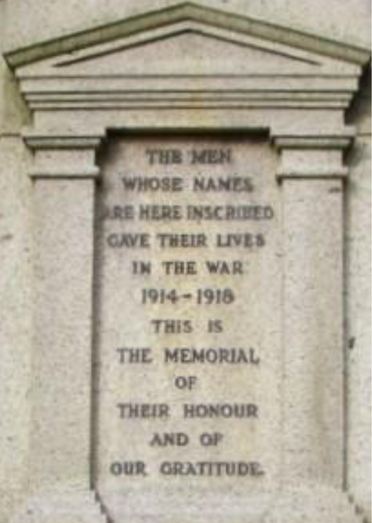
READING OF THE ROLL
Lieut. Wilson then read the roll, and said, "The men whose names are here inscribed gave their lives in the War 1914-1918. This is the memorial of their honour and of our gratitude." The names inscribed on the roll are: -- W. Armitage, T.O.H. Bates, A. Bedford, W. Beevers, H. Best, F. Blythe, A.J. Brown, L. Bywater, F. Clay, A. Connell, H.S. Crowther, L. Crowther, F. Fowler, W. Garforth, G.H. Haiste, F.H. Hall, T. Harris, F.W. Holmes, J. Hudson, J. Hughes, G. Jagger, G. Johnson, J.W. Kellett, J. Lightowler, A.E. Lockwood, F. Manners, A. Marshall, H. Mitchell, W. Mitchell, M. Morgan, E. Naylor, L. Naylor, N. Naylor, H. Nicholson, J. Nisbet, F. Ogden, J.W. Parker, C. Popplewell, L. Ramsden, J.T. Rawson, E. Robinson, F. Scargill, G.A. Smith, R. Sowden, C.W. Stephenson, L. Stephenson, H. Steward, F. Thackray, H. Thresh, M.L. Toulman, B. Ventress, W.M. Ward, A.E. Waterhouse, M.O. Watson, E.V. Watson, J. Wilson, A. Wormald, W. Wormald.
Two buglers of the Leeds Rifles then sounded the "Last Post," and after a minute's silence of remembrance, the "Reveille" was sounded. After the singing of "For all the Saints" the benediction was pronounced by the Rev. F. Hurst.
The first wreath was placed by Councillor Brooke, on behalf of the War Memorial Committee, and Councillor Seed also placed a wreath for the Council. On behalf of the ex-Service men Pte. Swaine laid a floral tribute at the base of the memorial, and then followed a sorrowful procession of the relatives of the fallen. Some of the children were carrying sheafs of wild flowers, which were placed alongside expensive wreaths from the places of business, clubs and religious institutions of the village. The service closed with the singing of the Hallelujah Chorus by the augmented choir.
Lieut. Wilson then read the roll, and said, "The men whose names are here inscribed gave their lives in the War 1914-1918. This is the memorial of their honour and of our gratitude." The names inscribed on the roll are: -- W. Armitage, T.O.H. Bates, A. Bedford, W. Beevers, H. Best, F. Blythe, A.J. Brown, L. Bywater, F. Clay, A. Connell, H.S. Crowther, L. Crowther, F. Fowler, W. Garforth, G.H. Haiste, F.H. Hall, T. Harris, F.W. Holmes, J. Hudson, J. Hughes, G. Jagger, G. Johnson, J.W. Kellett, J. Lightowler, A.E. Lockwood, F. Manners, A. Marshall, H. Mitchell, W. Mitchell, M. Morgan, E. Naylor, L. Naylor, N. Naylor, H. Nicholson, J. Nisbet, F. Ogden, J.W. Parker, C. Popplewell, L. Ramsden, J.T. Rawson, E. Robinson, F. Scargill, G.A. Smith, R. Sowden, C.W. Stephenson, L. Stephenson, H. Steward, F. Thackray, H. Thresh, M.L. Toulman, B. Ventress, W.M. Ward, A.E. Waterhouse, M.O. Watson, E.V. Watson, J. Wilson, A. Wormald, W. Wormald.
Two buglers of the Leeds Rifles then sounded the "Last Post," and after a minute's silence of remembrance, the "Reveille" was sounded. After the singing of "For all the Saints" the benediction was pronounced by the Rev. F. Hurst.
The first wreath was placed by Councillor Brooke, on behalf of the War Memorial Committee, and Councillor Seed also placed a wreath for the Council. On behalf of the ex-Service men Pte. Swaine laid a floral tribute at the base of the memorial, and then followed a sorrowful procession of the relatives of the fallen. Some of the children were carrying sheafs of wild flowers, which were placed alongside expensive wreaths from the places of business, clubs and religious institutions of the village. The service closed with the singing of the Hallelujah Chorus by the augmented choir.

